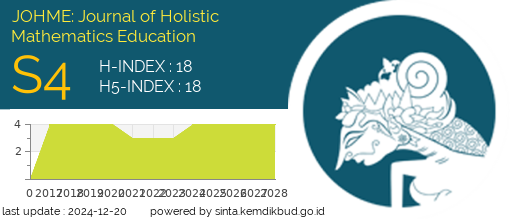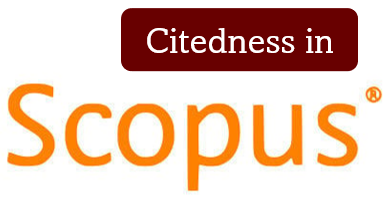AN INVESTIGATION INTO THE INTERVENTION STRATEGIES IMPLEMENTED BY EDUCATORS IN ENHANCING LEARNERS’ UNDERSTANDING OF NUMBER SENSE
DOI:
https://doi.org/10.19166/johme.v7i2.7140Keywords:
intervention strategies, number sense, mathematics performanceAbstract
Global and country-specific mathematics performance constitutes a major challenge, both for educators and policymakers. Realisation of the African Union Agenda 2013 hinges significantly upon transformation of education. In this regard, mathematics and science education, specifically, are instruments for scientific and technological development to position Africa on the same level as the global league of continents in the future. It is, therefore, important to develop amongst learners a good understanding of a mathematical concept such as number sense from an early age, given that students who have a good sense of numbers can manipulate figures to simplify calculations and have the confidence to approach problems in a variety of ways. It is for this reason that the present study investigates the intervention strategies implemented by educators in enhancing learners’ understanding of number sense in the Ekurhuleni North District schools, Gauteng Province, South Africa. The study used a case study design and a qualitative research approach, both of which were supported by an interpretivist paradigm. The study made use of a semi-structured interview to gather data from mathematics teachers, learners, and a principal in the selected school. Research findings revealed that although mental computation, use of concrete props, use of the number line, and a counting strategy are some of the various strategies employed to enhance learners’ understanding of number sense, teachers need to develop a sound understanding of number sense and be flexible in their approaches in order to assist learners. Based on the findings, it was recommended that curriculum designers and teachers concentrate on teaching methods to help students develop learners’ number sense, as this can lead to potential mathematics success.
References
Alhojailan, M. I., & Ibrahim, M. (2012). Thematic analysis: A critical review of its process and evaluation. West East Journal of Social Sciences, 1(1), 39-47. Retrieved from https://faculty.ksu.edu.sa/sites/default/files/ta_thematic_analysis_dr_mohammed_alhojailan.pdf
Alsawaie, O. N. (2012). Number sense-based strategies used by high-achieving sixth grade students who experienced reform textbooks. International Journal of Science and Mathematics Education, 1071-1097. https://doi.org/10.1007/s10763-011-9315-y
Askew, M. (2012). Transforming primary mathematics. London, UK: Routledge. https://doi.org/10.4324/9780203806746
Averett, C., Ferraro, D., Tang, J., Erberber, E., & Stearns, P. (2018). Trends in international mathematics and science study (TIMSS). Retrieved from https://nces.ed.gov/statprog/handbook/pdf/timss.pdf
Brijlall, D., Bansilal, S., & Moore-Russo, D. (2012). Exploring teachers' conceptions of representations in mathematics through the lens of positive deliberative interaction. Pythagoras, 33(2), 1-8. https://doi.org/10.4102/pythagoras.v33i2.165
Bryman, A., & Bell, E. (2015). Business research methods. Oxford, UK: Oxford University Press.
Cohen, L., Manion, L., & Morrison, K. (2018). Research methods in education (8th ed.). New York, NY: Routledge. https://doi.org/10.4324/9781315456539
Creswell, J. (2014). Research design: Qualitative, quantitative and mixed approaches. Thousand Oaks, CA: Sage Publications.
Creswell, J. W., & Creswell, J. D. (2018). Research design: Qualitative, quantitative, and mixed methods approaches (5th ed.). Los Angeles, CA: Sage Publications.
Danielson, C. (2011). Enhancing professional practice: A framework for teaching. Alexandria, VA: Association for Supervision and Curriculum Development.
de Boer, H., Donker, A. S., & van der Werf, M. P. (2014). Effects of the attributes of educational interventions on students' academic performance: A meta-analysis. Review of Educational Research, 84(4), 509-545. https://doi.org/10.3102/0034654314540006
de Vaus, D. (2013). Surveys in social research. London, UK: Routledge. https://doi.org/10.4324/9780203519196
Graven, M., Venkat, H., Westaway, l., & Tsheasane, H. (2013). Place value without number sense: Exploring the need for mental mathematical skills assessment within the annual national assessments. South African Journal of Childhood Education, 3(2), 131-143. https://doi.org/10.4102/sajce.v3i2.45
Greeno, J., & Egestrom, Y. (2014). Learning in activity. The Cambridge Handbook of The Learning Sciences, 128-147. Cambridge, UK: Cambridge University Press. https://doi.org/10.1017/CBO9781139519526.009
Hammersley, M. (2013). The myth of research-based policy and practice. Los Angeles, CA: Sage. https://doi.org/10.4135/9781473957626
Hanushek, E., Peterson, P., Talpey, L., & Woessmann, L. (2010). The economics of international differences in educational achievement. Cambridge, UK: National Bureau of Economic Research.
Kilpatrick, J. (2014). History of research in mathematics education. Encyclopedia of mathematics education. Dordrecht, Netherlands: Springer. https://doi.org/10.1007/978-94-007-4978-8_71
Landsberg, E. (2019). Address barriers to learning: A South African perspective. Hatfield, Pretoria: Van Schaik Publishers.
Mamogale, S. M. (2019). Teacher experiences in teaching number sense in the foundation phase [Unpublished dissertation]. Pretoria: University of Pretoria.
Marshall, C., & Rossman, G. (2011). Designing qualitative research (5th ed.). Thousand Oaks, CA: Sage Publications.
McLead, S. (2023). Vygotsky's sociocultural theory of cognitive development. Retrieved from http://www.simplypsychology.org/vygotsky.html
McMillan, J., & Schumacher, S. (2010). Research in education: Evidence-based enquiry. Upper Saddle River, NJ: Pearson Education.
Mekonnen, G. T. (2017). The current teacher education programs in Ethiopia: Reflection on practice. Educational Research and Reviews, 12(6), 366-372. Retrieved from https://files.eric.ed.gov/fulltext/EJ1138138.pdf
Mlachila, M. M., & Moeletsi, T. (2019). Struggling to make the grade: A review of the causes and consequences of the weak outcomes of South Africa's education system. https://doi.org/10.5089/9781498301374.001
Mncube, V., & Olawale, E. (2019). Empowering teachers for eLearning in South African schools: Readiness for the fourth industrial revolution? 12th Annual International Conference of Education Seville, Spain, 36-44. https://doi.org/10.21125/iceri.2019.0021
Mncube, V., Olawale, E., & Hendricks, W. (2019). Exploring teachers’ readiness for e-Learning: On par with the fourth industrial revolution. International Journal of Knowledge, Innovation and Entrepreneurship, 7(2), 5-20. Retrieved from https://www.academia.edu/40371938/Exploring_teachers_readiness_for_e_Learning_On_par_with_the_Fourth_Industrial_Revolution
Muijs, D., & Reynolds, D. (2017). The effectiveness of the use of learning support assistants in improving the mathematics achievement of low achieving pupils in primary school. Educational Research, 45(3), 219-230. https://doi.org/10.1080/0013188032000137229
Mullis, I., Martin, M., Foy, P., & Hooper, M. (2016). TIMSS 2015 International National Council of Educators of Mathematics NCTM, Principles and Standards for School Mathematics. Retrieved from https://timssandpirls.bc.edu/timss2015/international-results/wp-content/uploads/filebase/full%20pdfs/T15-International-Results-in-Mathematics.pdf
Olawale, B. E. (2022). Democratic citizenship in mathematics teacher preparation in South African universities: Contradictions in theory and practice. International Journal of Pedagogy and Teacher Education, 6(2), 126-139. https://doi.org/10.20961/ijpte.v6i2.61574
Olawale, B., Mncube, V., & Hendricks, W. (2022). Educational integration of digital technologies during covid-19 pandemic: An experiment in the face of emergency remote learning? EDULEARN22 Proceedings, 245-250. https://doi.org/10.21125/edulearn.2022.0078
Provasnik, S., Kastberg, D., Ferraro, D., Lemanski, N., Roey, S., & Jenkins, F. (2012). Highlights from TIMSS 2011: Mathematics and science achievement of US fourth-and eighth-grade students in an international context. National Center for Education Statistics. Retrieved from https://nces.ed.gov/pubs2013/2013009.pdf
Rahman, A., Ahmar, A., & Rusli, R. (2016). The influence of cooperative learning models on learning outcomes based on students' learning styles. World Transactions on Engineering and Technology Education, 14(3), 1-6. https://doi.org/10.4236/wjet.2016.41001
Ruthven, K., & Hofmann, R. (2013). Chance by design: Devising an introductory probability module for implementation at scale in English early-secondary education. ZDM, 409-423. https://doi.org/10.1007/s11858-012-0470-6
Sayed, Y., & Kanjee, A. (2013). Assessment in sub-Saharan Africa: Challenges and prospects. Assessment in Education: Principles, Policy & Practice, 20(4), 373-384. https://doi.org/10.1080/0969594X.2013.849056
Schunk, D. H. (2012). Learning theories: An educational perspective. Hoboken, NJ: Pearson.
Silverman, D. (2020). Qualitative research. Los Angeles, CA: Sage Publications.
Siyepu, S. (2013). The zone of proximal development in the learning of mathematics. South African Journal of Education, 33(2), 1-13. https://doi.org/10.15700/saje.v33n2a714
Stringer, E. (2014). Action research (4th ed.). Thousand Oaks, CA: Sage Publications.
Tsanwani, A., Harding, A., Engelbrecht, J., & Maree, K. (2014). Perceptions of teachers and learners about factors that facilitate learners' performance in mathematics in South Africa. African Journal of Research in Mathematics, Science and Technology Education, 18(1), 40-51. https://doi.org/10.1080/10288457.2014.884262
Tsao, Y. L., & Lin, Y. C. (2011). The study of number sense and teaching practice. Journal of Case Studies in Education, 1-14. Retrieved from https://files.eric.ed.gov/fulltext/EJ1057181.pdf
van de Walle, J., Karp, K., & Bay-Williams, J. (2013). Elementary and middle school mathematics: Teaching developmentally (8th ed.). Boston, MA: Pearson.
van de Walle, J., Karp, K., M, Bay-Williams, J., Brass, A., Bentley, B., Ferguson, S., & ... Wilkie, K. (2019). Primary and middle years mathematics: Teaching developmentally. Melbourne, Australia: Pearson.
Venter, R. D. (2012). The implementation of adaptive methods of assessment (particularly amanuenses) at four schools in the Gauteng East District of the Department of Education [Unpublished dissertation]. Johannesburg: University of Johannesburg.
Vygotsky, L. S. (1980). Mind in society: Development of higher psychological processes. Boston, MA: Harvard University Press. https://doi.org/10.2307/j.ctvjf9vz4
Yin, R. (2014). Case study research: Design and methods. Thousand Oaks, CA: Sage Publications.Downloads
Additional Files
Published
How to Cite
Issue
Section
License
Authors who publish with this journal agree to the following terms:
1) Authors retain copyright and grant the journal right of first publication with the work simultaneously licensed under a Creative Commons Attribution License (CC-BY-SA 4.0) that allows others to share the work with an acknowledgement of the work's authorship and initial publication in this journal.
2) Authors are able to enter into separate, additional contractual arrangements for the non-exclusive distribution of the journal's published version of the work (e.g., post it to an institutional repository or publish it in a book), with an acknowledgement of its initial publication in this journal.
3) Authors are permitted and encouraged to post their work online (e.g., in institutional repositories or on their website). The final published PDF should be used and bibliographic details that credit the publication in this journal should be included.”










